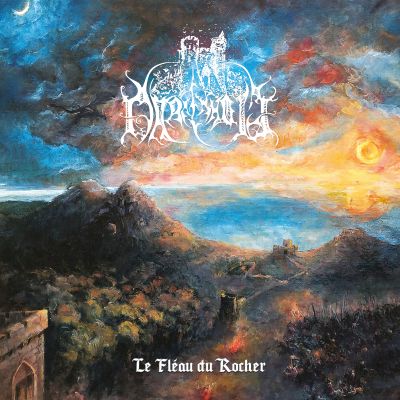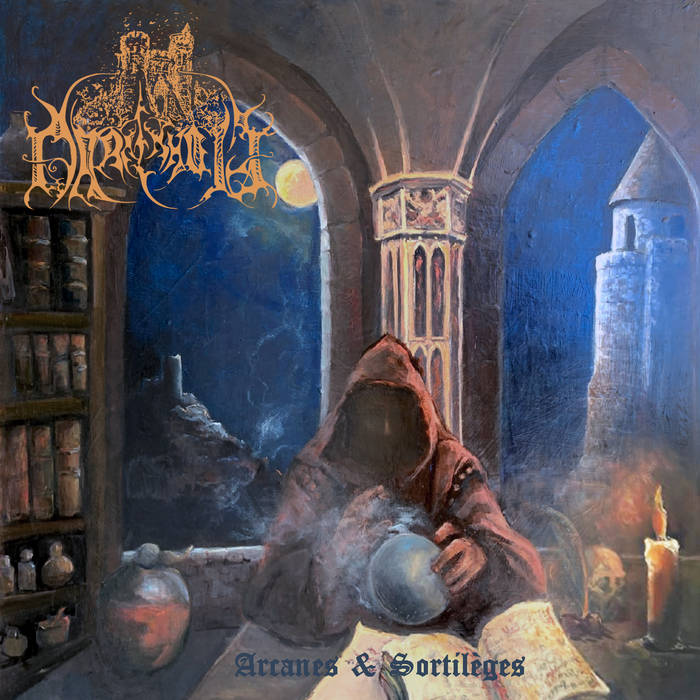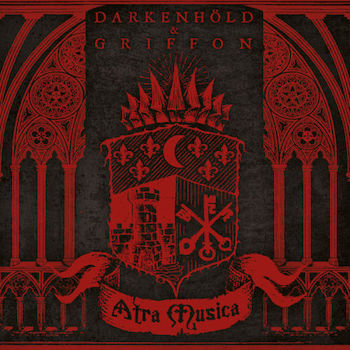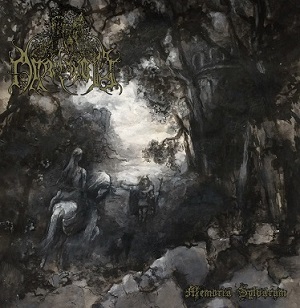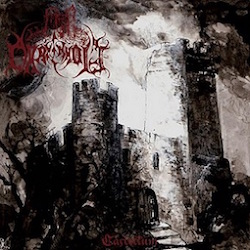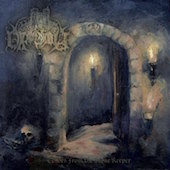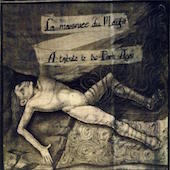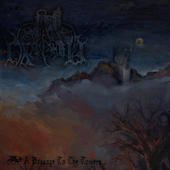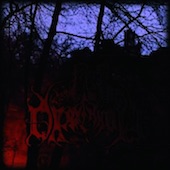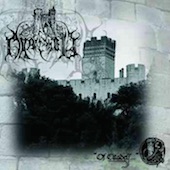Darkenhöld - Interview
It's very common these days to come across black metal bands that delve into medieval themes revolving around castles, history, and fantasy, but very few of them really managed to pull it off quite as well as you'd expect. A case and point among these exceptional bands is Darkenhöld from France, with their discography consisting of 5 full-length albums and still spreading that dark age mysticism to the masses to this very day. They have recently announced on their social media that they have been working on a new full-length album as a follow-up to the predecessor Arcanes & sortilèges from 2020, continuing their sacred tradition which lasted over the course of 16 years. For this occasion, I've decided to reach out to their guitarist Guillaume Vrac, also known as Aldébaran, and in our conversation, we've discussed the current situation regarding the new Darkenhöld album, the band's evolution throughout the years, the use of medieval themes in their music, and we even brought up other subjects along the way such as Guillaume's YouTube channel which covers everything from Yngwie Malmsteen, The Beatles to Duke Ellington, Satyricon and Johann Sebastian Bach. I hope you will enjoy this conversation, and in case you haven't yet checked out the band Darkenhöld, but if you happen to be a fan of the early days of bands like Emperor, Satyricon, Dimmu Borgir, Gehenna, and Abigor, I highly recommend you do, because they're an awesome band all the way through.
Vladimir

Hey, Guillaume. How is it going?
Hello, I am fine. And you?
Not too bad. I've seen the post recently that you guys are working on a new album at the moment. How is everything coming along so far?
Yes. Really great. I don't remember exactly, but I think it was 4 years ago since we released our latest efforts, but I had lots of riffs and ideas that I put on my computer somewhere and in fact we didn't have a real plan to record a new album. We knew that the label awaited a new album, but it was not like we were obliged to do something, in fact. So yes, I had all those ideas, but it was all spontaneous ideas that I had, and it was really spontaneous and not really full. It's what I'm saying. I checked the songs that I had and I thought "yeah, maybe I have something to record a new album", and Cervantes was really happy, because in fact, he did not expect that, I had enough material to record a new album, and so it was a good surprise for him. And, for me too, because I didn't know I had as much as we had. He was really enthusiastic about it, so we began to make plans, and in fact, the problem was booking a studio to record the drums, and in general, studios are full as they are all booked, but we had a friend, his name is Nicolas and he's a drummer for many bands. So yes, he's a little bit famous in our area and he has a YouTube channel. He records drums, but he's not like a famous studio for recording, but we trust him and so it was easy to book him. And he has lots of drums so we could pick the right snare, the right tone, the right cymbal, and for me, the main thing is to have a good drum sound, a good drum tone. And, I knew that it could be possible with him. So yes, we've recorded the drums, but in a really, faster way because our drummer had to go to Japan like 1 month after. It was a really short time, but he did a great job. So, for the moment, we have the drums, we have rhythm guitars, bass, and some synths. So, I think we are in the middle of the new album for the first moment.
It's good that you picked the right time to work on the new album now, especially because it's been 4 years since your previous album. And it seemed to me like bigger attention has shifted towards Darkenhöld, mostly because of the various promotional platforms for black metal bands that give guys like you more exposure. Tell me, do you feel the same way that there's, like, more attention coming towards the band?
From my point of view, I don't really know. Maybe each album is a new step for recognition, but it's not like we are really big. So yes, we have some feedback and I don't know about the sales, but yes, I think we have more attention for the band, and it's good because we really build step by step. We didn't have a big, big success. So, in a way, I prefer it, because it's more authentic. I don't know how to say it, but we are not disturbed by too much success, but it's good to have some people that are listening to our band. And, yes, we are now on Spotify, on YouTube, on different platforms, and maybe it makes it possible to have more audience.
I wasn't gonna bring this up, but since this year's Olympic Games took place in France, everybody went crazy when they saw Gojira playing at the Conciergerie, and honestly, I must say that I really wasn't as impressed as everyone else because I think they just don't fit the vibe of that courthouse. I personally find bands like Darkenhöld more suitable for that occasion, but obviously you can't expect the Olympic Games to have a deeper understanding of metal music, let alone black metal music which I don't think they would ever allow to be played. But out of curiosity, would you guys have accepted to play there if you got the offer?
No. It would be really crazy. I'm not sure because, I don't know if it fits Darkenhöld at all, if the place really fits the music and lyrics, but, as far as the global games go, I don't know. If someone asked us for real, maybe we would change our view, but no. I would not agree to play, I think because it doesn't fit really. It's not like we are a true darker underground band, but I think it doesn't fit in my opinion. But the place is really great and I visit it sometimes, and I know The Chapelle, it's a medieval place and all the towers are medieval. So, yeah, it's great and I think it's my favorite place in Paris, in fact.
A band such as Darkenhöld is very exemplary in the sense that you guys manage to transcend that medieval atmosphere and the energy of the Dark Ages, with castles and fantasy playing a crucial role in your musical expression. The only other French black metal bands that I am aware of, that also do that, are Véhémence and Aorlhac, and all of you seem to provide a great throwback to the early days of bands like Emperor, Satyricon, Gehenna, and Dimmu Borgir. I am curious to know, why are you guys so drawn to that medieval darkness. Is it because of mysticism or something else entirely?
It's not really conscious and really premeditated. I think for me, it was a long time ago, I was really into that kind of metal and mixed with some historic and medieval atmospheres, but, it's not really conscious. It's just that I like that vibe. Also, regarding metal, my favorite black metal is mainly medieval-oriented or epic, maybe, sometimes when we think about it, but yes, Dark Medieval Times, it's really a masterpiece for us and really an album that really has something for us, but not really Satyricon of nowadays, but that that particular era of Satyricon is really great. And the bands that you quoted are really our taste regarding metal. And, yes, we also like some old fantasy, like you said, like a game book, like a role-playing game, that type of universe, and it just fits with what we want to express. And it's not only fantasies, but we also like some historical stories, and so we like to mix a bit of everything. But it's not really something we planned before, it's just that we like that type of atmosphere.
You guys have certainly evolved as artists and musicians since your early years, and anyone who is well-met with your discography can see the band's gradual development, but most notably you switched from lyrics in English to French from your fourth album Memoria Sylvarum. Was the decision to change the lyrics to your native language one of the things you wanted to do as a means of innovation or just a matter of better lyrical expression?
Yes. I think you're right. It's a main evolution in our discography, from English to French, and in fact, we were not so at ease with English, and especially, Cervantes is really great in French. He's a good reader and a really great lyricist in French, but English is not his mother tongue. He always wrote in English from the beginning, but he had to translate the lyrics and sometimes it was not as good as in French. So, I think it was with Castellum, the 3rd album, it got a bit better with French, and it's more personal, there is more identity, I think, when you write in your mother language and we have more vocabulary. It's more correct also. Sometimes, our lyrics were not really correct. So, we were a bit afraid to switch to French because it's not so easy to sing in French, in fact. Maybe English sounds better in a way, with more accents, for example, and French is more monotonous, so we are a bit afraid of that, but it came nicely, so now we continue, and we will not change, for the moment. We are still in French for the next album.
Speaking of exposure, I was lucky to have discovered the band through you Guillaume, particularly through your YouTube channel where you frequently post song covers and tabs from old-school heavy metal to classical music. I gotta ask, what made you want to start a YouTube channel with this kind of content?
It was really a commodity, I have to say. Down to earth really for money. I started my YouTube channel for money because I am a guitar teacher, and it was in my life when I had really serious problems with money, I really needed money, and I did not have any solution. So, I thought, yeah, maybe I could start a YouTube channel and maybe have some students to have more lessons, and so, I just started really modestly. It was just some views, at the beginning it was really amateurish with a really few, audience, but I kept uploading YouTube videos and it became bigger. And, I noticed that it's better with tabs because it's more useful for everybody to have music plus the sheet music of the tabs, so everybody can play the song. I also like it because sometimes I want to play songs that I don't know yet, and I think "yes, I could do the tabs and make a video of it". So, I learned that also for myself, but for classical music and heavy metal, it's just music that I like. And, now there is more attention so I can be more regular in putting new videos online.
Did your YouTube channel in any way help you gain more fans for Darkenhöld?
I don't know. Maybe some I think, it's really minor. I think it helps a bit, but not so much. I think there are lots of people who follow my YouTube channel but don't care about black metal, because it's not so much in my YouTube channel.
Since you guys are obviously well-met with classic black metal acts, I am curious to know what was your upbringing like for that subgenre. Were you guys lucky to experience the rise of black metal in the 90's or did you catch it up later throughout the years?
Yes. I started to discover Black Metal, I think it was in 1995 around that year, and I think that Emperor, Burzum, Satyricon, Dimmu Borgir have already released the main albums, but it was really small in France, at least. Black Metal was really something underground at the time, but it was in our magazine. We had little people who talked about it, and I began to buy fanzines also around that time, so I discovered mainly from the magazine and I also bought some compilations. There's some Blackened compilation and I think it was released in that year like 1995, and you had all the great bands of Black Metal. You have Dark Funeral, Emperor, Marduk, everything. But at the time, they were not so big. So, it's funny to see that now they are like, not so big, but like major bands. But at the time, they were really underground. So, I discovered it like this. I didn't have so many people around me to share my interest in black metal, just a friend in Paris, who also had a taste for that kind of music, but there were really few people who understood. I don't know about you, but for me, when I started, it was a bit like strange music. I was a bit impressed by the imagery, and the lyrics, the music was a bit scary in fact at the time, but I started to become more used to it and I could listen. There are some melodies, some atmospheres, and it's not just about Satan or destruction or man, there was something behind this, like you said, histories, castles, nature, fantasy, atmosphere, mysticism. So, it was not just, we are the devil, and we all want to destroy everything. It was more profound and more rich in fact. When you listen to Emperor, for example, it's not just some basic black metal, it's more in a classical way, so I thought it was really interesting at the time.
Yeah. I have to agree because when I was, like, 14 turning 15, when I heard the classic Norwegian black metal bands, I also thought the music was quite scary because I had never heard anything like it. As time went on, that's when I kind of got a better understanding of the music itself, like the instrumental work and also the songwriting and the atmosphere. And there was something that kind of soaked me in, especially like you said, there are so many different styles, variations, and, of course, layers to black metal music. When you mentioned someone like Emperor - In the Nightside Eclipse for example, there's great musicality all over the place, and you can even take Dissection for example. It's basically like classical music elements in this kind of melodic black metal, and you also have other bands that were in that same wave of bands. So, yeah, it's kind of a really special feeling when you dig deeper and see something in it, but in your case, you were lucky to have discovered it around the time when it was growing, when all the bands were very small underground bands, and now they're world-class acts.
Yeah. I was really impressed to see the evolution of the recognition of black metal because I thought that nobody cared about that music because it was too strange or too extreme, but it gained more and more, like you said, world-class recognition. And, you know that there are some museums where you can find black metal. So, now it's more academic in a way. But, at the time, it was not academic. It was just like "What is this crazy shit for magazines in France?" They talked really badly about that genre because there were just 1 or 2 journalists who really took it seriously. But the other ones, they were more like traditional hard rock, and they just thought it was just murderers and criminals, but not really musicians. So, as for the view of the people, regarding black metal mainly, they saw it as a joke. Maybe some people thought it was maybe not serious, but now it's something.
Back then, everybody would give negative press about these bands, but as they say, even bad press is good press. There is no such thing as bad press. So, basically, if you say something terrible about a band, it's obviously gonna get more attention from teenagers and it even becomes more accepted. You take a look at Covenant playing at the Norwegian Grammy Awards, and you have Covenant winning the Norwegian Grammy for Nexus Polaris. It basically means that somebody said "You know what? This is an attraction. Why should we treat it differently?" As you said, now there are lessons about it, there are even museums about it and there's everything else about it. Norway accepted black metal as a part of its national history. It's not like they accepted it just for the crimes, but it's also because of the music. They look at it as something that really left a mark on Norway, and it's a big tourist attraction. That's why you have a lot of these tourists going to Norway to see all these locations that were mentioned in documentaries and interviews and even in some books or other media. It's very special when you are a kid growing up in the nineties, reading magazines and fanzines about black metal and getting to know the bands better. That really was something special and you are a very good witness to that.
Yeah, but, after all, I'm not in the right area for black metal. We have more of a French Riviera with yolks and luxury. I think it was the right side, maybe, to listen to that kind of music. I think sometimes that the music, when it's created, fits with the time, what we call a "zeitgeist" or something like that. When it's the right music for the right time, it fits with the moment. For example, traditional heavy metal, we say traditional for British heavy metal from the early eighties. You have that golden age now, for black metal, there was a golden age too, I think. But, yeah, we had some bands at the time also in our era like Godkiller, and he started during that time. It was like an international community also as they were tape trading and everything. And I know that, for example, Godkiller used to trade with Silenoz from Dimmu Borgir and probably the guys from Mayhem. For example, we also had a band called Aggressor. It's a death metal, but death/thrash or thrash/death, and he knew the guys of Mayhem and Bathory, he used to meet Quorthon from Bathory. He was there in the eighties because he was aware of that extreme black metal scene and he was in contact with Euronymous and with Quorthon also, and he used to live really close to where I live, so it was connected. Everything was connected even if you were not in the right place in a way.
Thank you so much for doing this interview. I am highly looking forward to seeing what the future has in store for Darkenhöld, but most importantly, best of luck to you and the rest of the band, and I can't wait to hear the new album. Any final words?
Well, thank you for contacting me. It's really a pleasure and an honor also because we didn't talk too much about our music for some years. So, it's good to talk about Darkenhöld now again. And, I think you are the first to talk about this new album. For the moment, we can't really reveal the details of it, but I think it would be in the tradition of Darkenhöld, and you will find the elements of our previous albums. If you like what we did before, it will not be so different, but still, it's a new album with different ideas, but in the continuity of our previous albums.
Discography
Upcoming Releases
- Morrath - Obscure Abominations - Feb 25
- Chalice - Divine Spear - Feb 27
- Blackwater Drowning - Obscure Sorrows - Feb 27
- Vide - Aux Enfants Des Ruines - Feb 27
- The Leaving - The Leaving - Mar 06
- Serpent Icon - Tombstone Stories - Mar 06
- Insect Inside - Reborn In Blight - Mar 06
- Triumpher - Piercing The Heart Of The World - Mar 06
- Lömsk - Act II - Of Iron And Blood - Mar 06
- Monstrosity - Screams From Beneath The Surface - Mar 13
- Against I - Anti Life - Mar 13
- Empire Of Disease - While Everything Collapses - Mar 19
- Putred - Blestemul Din Adânc - Mar 20
- Gaerea - Loss - Mar 20
- Diatribes - Degenerate - Mar 20
- Zerre - Rotting On A Golden Throne - Mar 27
- Foetorem - Incongruous Forms Of Evergrowing Rot - Mar 27
- Cryptworm - Infectious Pathological Waste - Mar 27
- Antrisch - Expedition III: Renitenzpfad - Mar 27
- Cruel Force - Haneda - Mar 27

